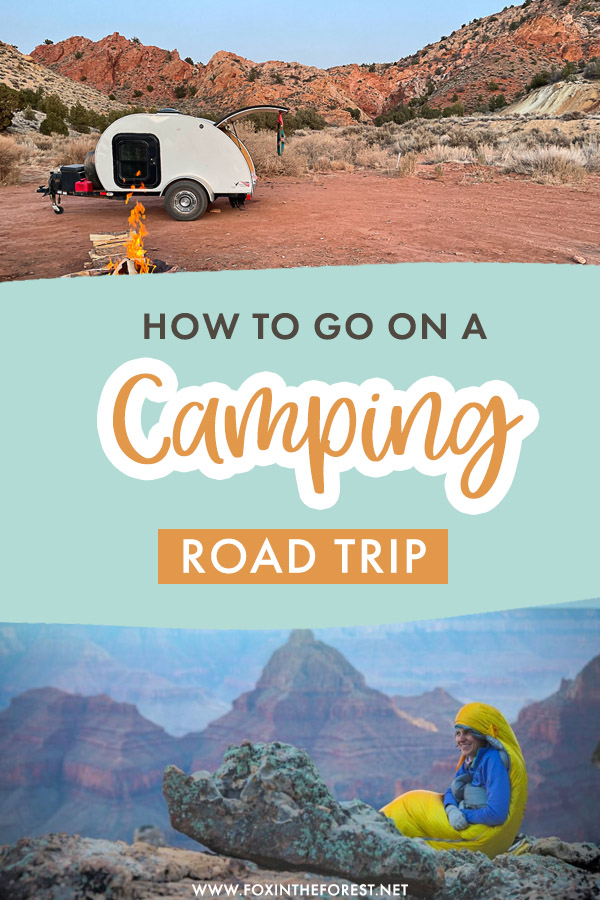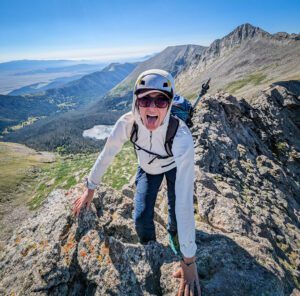Last Updated on September 27, 2022 by foxintheforest
Planning a camping road trip doesn’t need to be stressful. In fact, camping is one of the easiest (and budget-friendly) ways to enjoy the open road. Ribbons of tarmac give way to gentle dirt roads that bring you right into the heart of the wilderness.
The key to successfully planning a camping road trip is to have a plan, have a budget, and leave plenty of room for flexibility. You want to have space for the unexpected. Plan on having a few bad weather days, and know when you need a break.
I take at least 12 camping road trips each year. It’s literally one of my favorite ways to spend time outside.
Over the years I’ve honed how to expertly plan a camping road trip. From where to go to what to pack you’re covered with expertly-curated advice.
Learn from my headaches and blunders so you can plan the ultimate camping road trip.
About this Guide to Planning a Camping Road Trip
In this guide to planning a camping road trip you’ll get expert level advice from a seasoned pro. I literally get paid as a freelance writer for the outdoors to go on camping road trips. Over the years, I’ve learned a thing or two. Here’s what you’ll find inside:
- A mega list of the best camping tips
- Planning and budgeting for a camping road trip
- How to choose campsites
- The best way to check the weather and how to manage it
- Meal planning tips
- How to stay squeaky clean on your camping road trip
- Leave No Trace techniques
- Camping road trip planner
- How and what to pack for your camping road trip
- Additional planning resources
Planning Your Route
Before you hit the road, be sure to plan your route. When it comes to planning the right route for your camping road trip, you’ll want to make sure you’ve got the basics covered. Start with the maximum time you’d like to drive each day.
Sure, you’ll see things along the way, but keep in mind, that heavy driving days can be exhausting, long, and don’t leave much time for exploring.
One of my favorite camping hacks is to get as far away from home as possible on the first day. This lets you get the big drive days over with quickly, when you have the energy.
Then, slow down. Plan for multiple days at one stop or only move an hour or two each day. This will let you maximize your time hiking, exploring, and going on adventures.
Slowly make your way back towards home, making as many stops as you’d like. Be sure to plan any reservable activities (popular tours, rentals, must-see sunrises, hiking/backpacking permits, campgrounds, etc) well in advance.
Balance planned activities with a few days of flexibility in between. This will help you stop feeling like you’re constantly running around, and gives time for letting the adventure come to you.
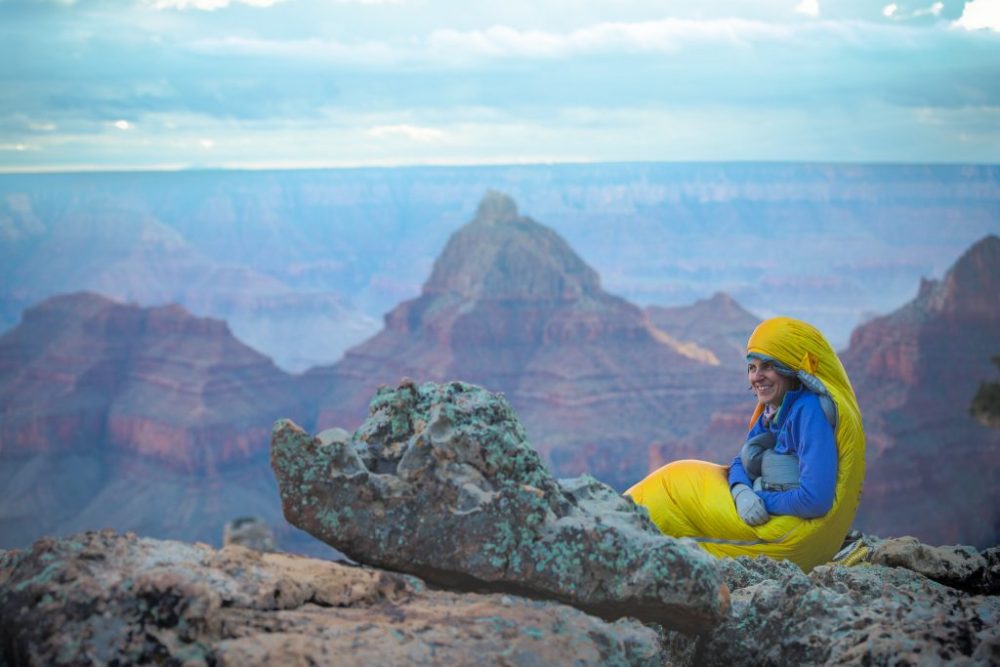
Download Google Maps and GPX Files
Before you leave home, download offline maps (tap your profile picture on Google Maps, select offline maps, and then select the region you’d like to download). Now you can navigate without cell phone service.
Save any dispersed campsites (more on that in a second) as “favorites” on your map so you can find them.
Lastly, take any and all trails and upload them to your GPS. Use your phone or a separate device. Now you’ve got your adventures all loaded and ready to rock.
Calculating a Budget
Next, calculate your budget. Camping road trips are tantalizing budget-friendly. However, it’s unrealistic to think you won’t be spending money while you’re away. In fact, you’ll likely spend more than you think.
A LOT of people use apps for this. But honestly, I’m a digital minimalist (don’t use a lot of apps) and I have about zero problems running a quick budget. Here’s how to do it.
- Calculate mileage – it doesn’t need to be exact, just round up when possible. Divide by the number of miles per tank your vehicle gets. Round up. Then multiply that by the average amount you spend on gas per tank. Again, just round up.
- Add in all the fees, permits, passes, activities you’d like to do.
- Add in your food cost – just use an average weekly grocery bill.
- Add in a few hundred dollars extra for extraneous expenses (shopping, eating out, car trouble, the random splurge).
- VOILA! You’ve got a rough budget.
The key is to constantly round up – that way you’ll budget for more than you need, especially if you plan on camping with a baby.
Do I Need to Pay for a Bunch of Apps for My Camping Road Trip?
In short – no. If apps help you plan and manage – then by all means, use them. But honestly, I’ve been going on camping road trips for the better part of a decade without any apps except my GPS and Google Maps.
That’s why this guide doesn’t include any app reccos – I simply don’t need them.
I find being without the phone extraordinarily freeing. If you want a break, consider just using a Google Doc to write down your route (download it for offline use) and just use map apps to navigate.
Or be bold and use nothing for a real adventure.
Get Your Vehicle Looked at
Before you head out, give your vehicle a once-over. When was the last oil change? Is your wiper fluid filled? How is the tread on your tires? Check your fluid levels.
Replace and fix anything that isn’t road ready. You’ll thank yourself – nothing dapens a camping road trip quite like car trouble!
When to Stay at a Hotel
I’ll let you in on a little camping road trip secret – always plan for a night or two at a hotel. One thing I really love to do is plan a few nights in the middle-end of my trip at a hotel or Airbnb.
Why? Because we all need a break from camping every now and again. Sometimes you just want some indoor space to stretch out in.
Also, if you budget for this and the weather gets crummy, you don’t have to sleep in the mud, snow, or extreme wind. (I’ve been there…many times.)
The point of a camping road trip is to have fun, so even if you plan on camping the entire time, have some cash set aside for the unexpected hotel stay. That way you can skirt bad weather and still find some fun instead of being miserable.
I regularly head out on camping road trips with my teardrop camper and I know I can do about 4 to 5 nights before I just need to be indoors for a night. I’ll refuel, clean up, do laundry, fill my water tank (which can be done at most truck stops if you ask nicely), and then hit the road again.
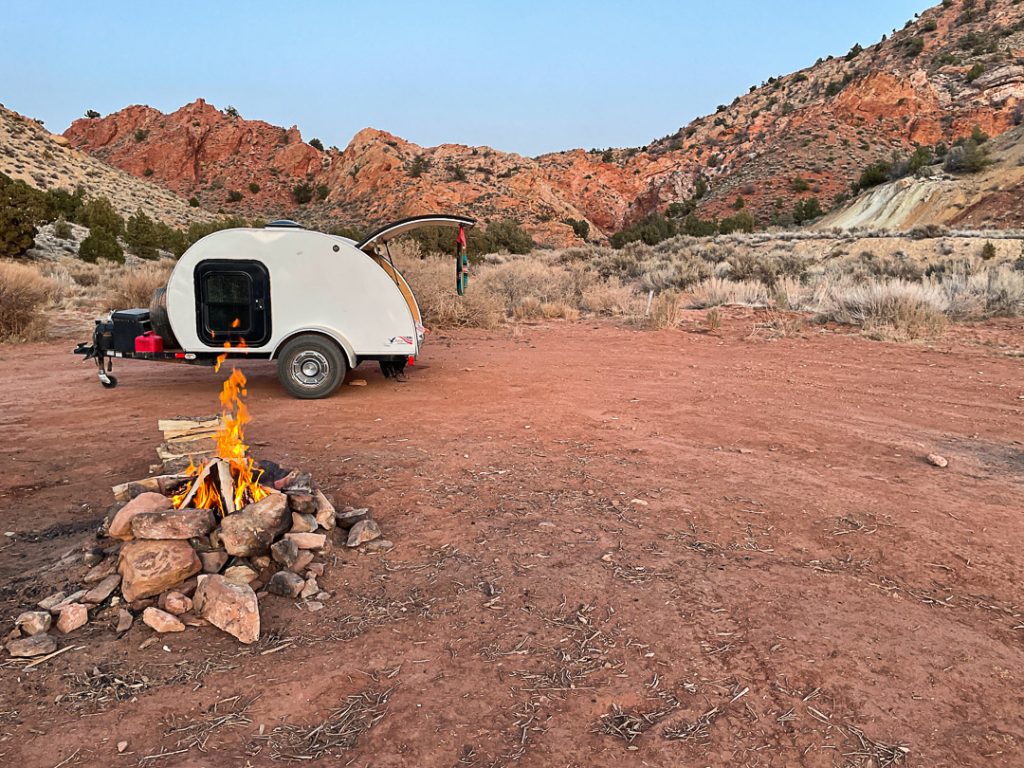
Choosing Campsites for Your Camping Road Trip
When you’re taking a camping road trip, the most important thing to plan is where you’ll camp along the way. Because without a spot to camp each night, it’s not really a camping road trip, now is it?
Depending on where you’ll be road tripping, you could have several different options for types of campsites. Here are some things to consider as you choose the right campsites for your trip.
Dispersed Camping
If you want to keep the costs of your camping road trip low, opt for free dispersed campsites. You can usually find free camping on BLM or US Forest Service Land, but you’ll definitely want to do some research ahead of time to find where you are allowed to dispersed camp and where there are designated dispersed sites.
Dispersed camping allows you to be super flexible and spontaneous with your trips plans since you don’t have to make reservations ahead of time. Of course, the flip side of this is that you could show up in a popular area and have to drive around for a while to find an open spot to pitch your tent.
Also, when you’re dispersed camping, keep in mind that you won’t have any campground amenities. Be sure to bring your own water supply and figure out your own toilet situation (bring a trowel or WAG bags, depending on the terrain and local regulations).
Want to learn how to find free camping the easy way? Get the Find Free Camping Mini-Course and learn my step-by-step proven method to finding the most beautiful camp spots that don’t cost a dime. (PS…like the photos? They were all sites that I found using this method!)
Paid Campgrounds
With paid campgrounds, you’re obviously going to be spending more money, but the fees might be worth it for the perks. At paid campgrounds, you’ll usually have access to some sort of bathroom, whether it’s a simple pit toilet or an actual bathroom with running water (and, gasp, maybe even showers!).
Reserved vs First-Come/First-Serve
Also, if you choose a reserved campsite, you’ll know you can just roll up and set up your tent without having to try to find an unoccupied site. Of course, to snag a reserved site, you probably will have to plan pretty far ahead of time, which can limit the “go-with-the-flow” factor of your camping road trip.
Some paid campgrounds have first-come/first-serve sites, which can be great if you’re going during less busy times. But during weekends and peak season, you might find you’re out of luck because the first-come/first-serve sites have all been snapped up.
Permits
If you’re planning to backcountry camp during your road trip, you should check ahead of time to see if you need a permit for the area you’ll be in. Sometimes you can walk up and get permits on the day you arrive, but in certain popular areas during peak season, you might need to reserve your permit ahead of time or you’ll be out of luck.
Preparing for the Weather on Your Camping Road Trip
When you plan a camping road trip, you usually have to plan for a variety of weather. Depending on the length of your trip, you might be passing through multiple regions with different climates. Even if you stay in one general area, the weather can still change throughout the course of your trip.
While there are tons of websites and apps with weather forecasts, weather.gov from the National Weather Service is a comprehensive way to check the forecast for various areas. You should check the weather before starting your camping road trip, as well as along the way, since the forecast can always change.
Meal Planning for Your Camping Road Trip
Honestly, food can make or break a camping road trip! While you can keep it simple or make it gourmet, just be sure you bring food that you’ll be happy to eat after a few days outside.
Your camp kitchen setup will affect what you can cook, so figure out whether you simply want to be able to boil water or whether you want a bigger car camping stove where you have more options.
If you bring a good cooler, you can bring meat, but if you’re vegetarian or doing dehydrated meals, you might not need one (or at least could just bring a smaller one for beverages).
On a camping road trip, you might be able to stop at a grocery store along the way, so you don’t necessarily need to bring all your food with you from the start. Buying food along the way also means you don’t have to worry as much about fresh food going bad during the trip.
Pro Tip: Meal plan a few meals. I’ll make 1-2 meals in advance so all I have to do is just heat them up at camp. Eating fresh and healthy keeps you feeling your best and meal prep is a great way to do that. Soups are a personal fav of mine. I’ll freeze them and they double as ice for a few days!
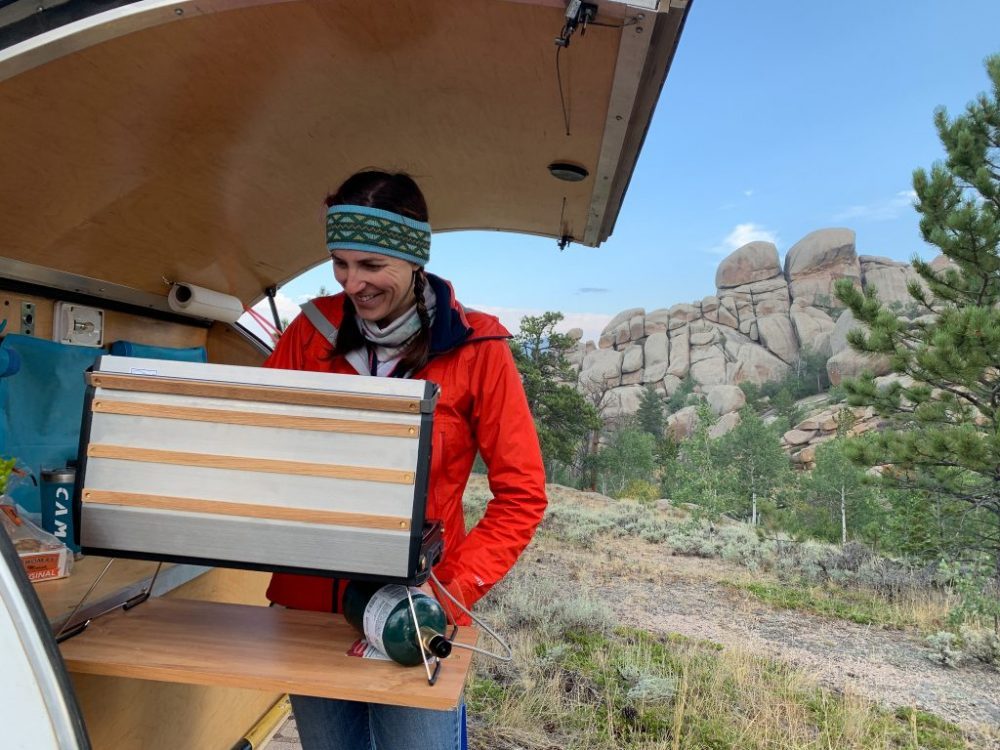
How to Be a (Relatively) Clean Dirtbag During Your Camping Road Trip
Sure, if you’re on a camping road trip, you can embrace your inner dirtbag a little bit. But you’ll still want to practice some backcountry hygiene so people don’t smell you coming down the road.
The number one product you don’t want to leave on your camping road trip without is a pack of baby wipes. These can keep you relatively fresh for several days, and also come in handy for cleaning your hands at mealtime. You’ll also want to bring some biodegradable soap, such as Dr. Bronner’s, which you can use to wash both yourself and your dishes and other gear.
And definitely don’t forget to bring a toilet kit if you’re dispersed camping with any facilities. Include a trowel to dig a cathole, toilet paper if you need it (but be sure to pack it out), and some hand sanitizer. When you’re camping in the desert, you should bring a WAG bag, too.
And if you menstruate, it’s always a good idea to bring some supplies, just in case! Nothing is worse than camping on your period if you’re not prepared.
If you do want to shower on your road trip, you can often find showers at truck stops. Another option is getting a day pass to a gym or rec center, which will give you access to the full facility, including showers. Also, some paid campgrounds will have showers, so you could splurge and reserve one of those for a night.
Leave No Trace of Your Camping Road Trip
Whenever you’re camping, you should practice the rules of Leave No Trace. Always set up your campsite on durable surfaces, ideally in a place that has already been used for camping, so you don’t destroy vegetation.
Also, anything you pack in, you must pack out – this includes toilet paper! And don’t burn your trash in a campfire. Bring along trash bags (designate one for trash and one for recycling) and take all of your waste home with you to dispose of it. Alternatively, dispose of your trash in bigger towns that can handle the influx from fellow road trippers.
For campfires, follow all fire bans and restrictions. If you are allowed to build a fire, ideally, you should do so in an already established fire ring to keep the fire contained. Make sure you have enough water with you to completely douse the fire.
One rule you might not know about is that you shouldn’t bring firewood into an area from more than 50 miles aways. This means you don’t need to fill your car with wood at the start of your trip, which makes packing easier anyway. Instead, stop and get firewood in the area where you’ll be camping for the night.
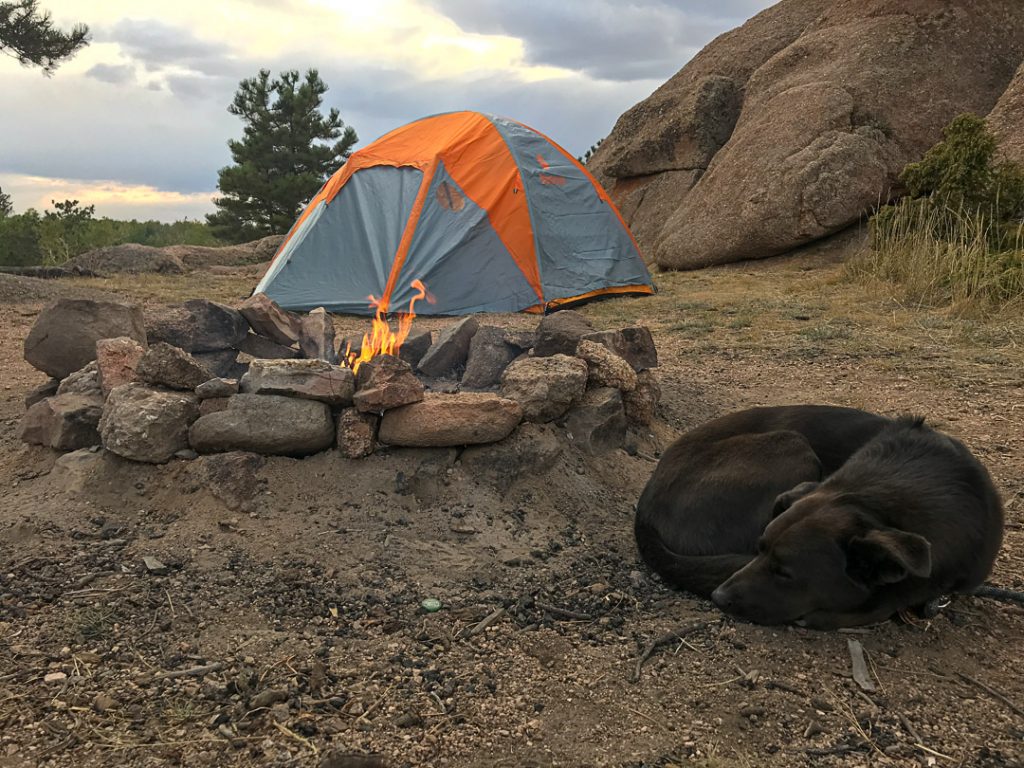
Camping Road Trip Planner Packing List
Here are some car camping essentials that you should always bring on a camping road trip:
- Tent (including rainfly)
- Sleeping Bag
- Sleeping Pad
- Camp Stove
- Cooking & Eating Utensils
- Food & Drinks
- Cooler
- Water Jug or Water Filter
- Bathroom Essentials (Trowel, Toilet Paper, Hand Sanitizer)
- Baby Wipes
- Biodegradable Soap
- Sunscreen
- Bug Spray
- Clothes (Lots of layers!)
- Camp Shoes and/or Sandals
- Headlamp
- Battery Charger/USB Cable
Packing for Your Camping Road Trip
Packing your vehicle properly will make or break your camping road trip. First, start with what you’ll need in the car – think snacks, water, wallet, (and masks these days) all in an accessible place.
Next, pack heavy items like your cooler, water jugs, and other must-have essentials in an easy-to-access place while you’re at camp.
If you’re hiking, backpacking, climbing, or doing some photography try to organize your gear in the order you’ll need it. Keep things that you don’t need anymore towards the back of your vehicle’s storage space, while the handy items stay in front.
Swap and rearrange your gear as you go along. That way your car doesn’t turn into a heap of stuff and you can’t find anything.
Pro Tip: Make it work for you! This system works REALLY well, but it may take a few days to dial in. Try to arrange things so you’re moving stuff around as little as possible. Always put must-have items like keys, headlamps, and lighters in the same spot every day so they don’t get lost.
Additional Resources
Planning a camping road trip? I’ve got you covered with an amazing list of helpful resources:
- Camping 101 What to Expect on Your First Camping Trip
- RV, Vanlife, and Camper Hacks You’ve Got to Try
- Hiking for Beginners
PIN THIS POST
